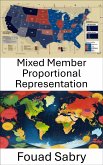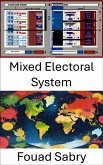Explore the transformative power of "Scorporo," a key addition to the Political Science series, unveiling corporate power's relationship with governance. In today’s political environment, corporate influence significantly impacts decision-making. This book explores electoral systems, revealing how voting mechanisms shape representation and corporate sway.
1-Scorporo-Discover the core concept of "Scorporo" and its effect on political systems.
2-Proportional Representation-Learn how proportional systems balance voter preferences and corporate interests.
3-Single Non-Transferable Vote-Explore the system's role in limiting corporate control in politics.
4-Additional Member System-Understand this hybrid system's impact on corporate-public power.
5-Mixed-Member Proportional Representation-Investigate how this method moderates corporate influence.
6-First-Past-The-Post Voting-Analyze this traditional method’s effect on representation and corporate dynamics.
7-Parallel Voting-Discover how combining voting systems affects corporate-political interaction.
8-Electoral System of Scotland-Review Scotland’s approach to corporate influence in politics.
9-Semi-Proportional Representation-Examine how this system balances political representation and corporate sway.
10-Electoral System-Overview various electoral systems and their implications for governance.
11-Overhang Seat-Understand overhang seats and how they shift the balance of corporate power.
12-Elections in Hungary-Analyze Hungary’s system and its reflection of corporate influence.
13-1996 Japanese General Election-Study how electoral reforms addressed corporate power in Japan.
14-Majoritarian Representation-Examine this system’s effect on political stability and corporate control.
15-National Remnant-Discover how national remnants shape the political-corporate landscape.
16-Dual-Member Proportional Representation-Explore how this system balances corporate interests and representation.
17-Mixed Electoral System-Understand the blend of voting methods and its impact on corporate power.
18-Italian Electoral Law of 2017-Review Italy’s electoral law and its effect on corporate-political dynamics.
19-Mixed Single Vote-Analyze how this system balances individual and corporate political interests.
20-Mixed Ballot Transferable Vote-Discover this system’s approach to enhancing representation while limiting corporate sway.
21-Mixed-Member Majoritarian Representation-Learn how this system shapes political outcomes and corporate influence.
"Scorporo" offers a rich analysis of electoral systems' impact on corporate power in modern governance. Perfect for students, professionals, and enthusiasts eager to understand the intricate relationship between political representation and corporate control. Embrace a deeper understanding of political science.
1-Scorporo-Discover the core concept of "Scorporo" and its effect on political systems.
2-Proportional Representation-Learn how proportional systems balance voter preferences and corporate interests.
3-Single Non-Transferable Vote-Explore the system's role in limiting corporate control in politics.
4-Additional Member System-Understand this hybrid system's impact on corporate-public power.
5-Mixed-Member Proportional Representation-Investigate how this method moderates corporate influence.
6-First-Past-The-Post Voting-Analyze this traditional method’s effect on representation and corporate dynamics.
7-Parallel Voting-Discover how combining voting systems affects corporate-political interaction.
8-Electoral System of Scotland-Review Scotland’s approach to corporate influence in politics.
9-Semi-Proportional Representation-Examine how this system balances political representation and corporate sway.
10-Electoral System-Overview various electoral systems and their implications for governance.
11-Overhang Seat-Understand overhang seats and how they shift the balance of corporate power.
12-Elections in Hungary-Analyze Hungary’s system and its reflection of corporate influence.
13-1996 Japanese General Election-Study how electoral reforms addressed corporate power in Japan.
14-Majoritarian Representation-Examine this system’s effect on political stability and corporate control.
15-National Remnant-Discover how national remnants shape the political-corporate landscape.
16-Dual-Member Proportional Representation-Explore how this system balances corporate interests and representation.
17-Mixed Electoral System-Understand the blend of voting methods and its impact on corporate power.
18-Italian Electoral Law of 2017-Review Italy’s electoral law and its effect on corporate-political dynamics.
19-Mixed Single Vote-Analyze how this system balances individual and corporate political interests.
20-Mixed Ballot Transferable Vote-Discover this system’s approach to enhancing representation while limiting corporate sway.
21-Mixed-Member Majoritarian Representation-Learn how this system shapes political outcomes and corporate influence.
"Scorporo" offers a rich analysis of electoral systems' impact on corporate power in modern governance. Perfect for students, professionals, and enthusiasts eager to understand the intricate relationship between political representation and corporate control. Embrace a deeper understanding of political science.








